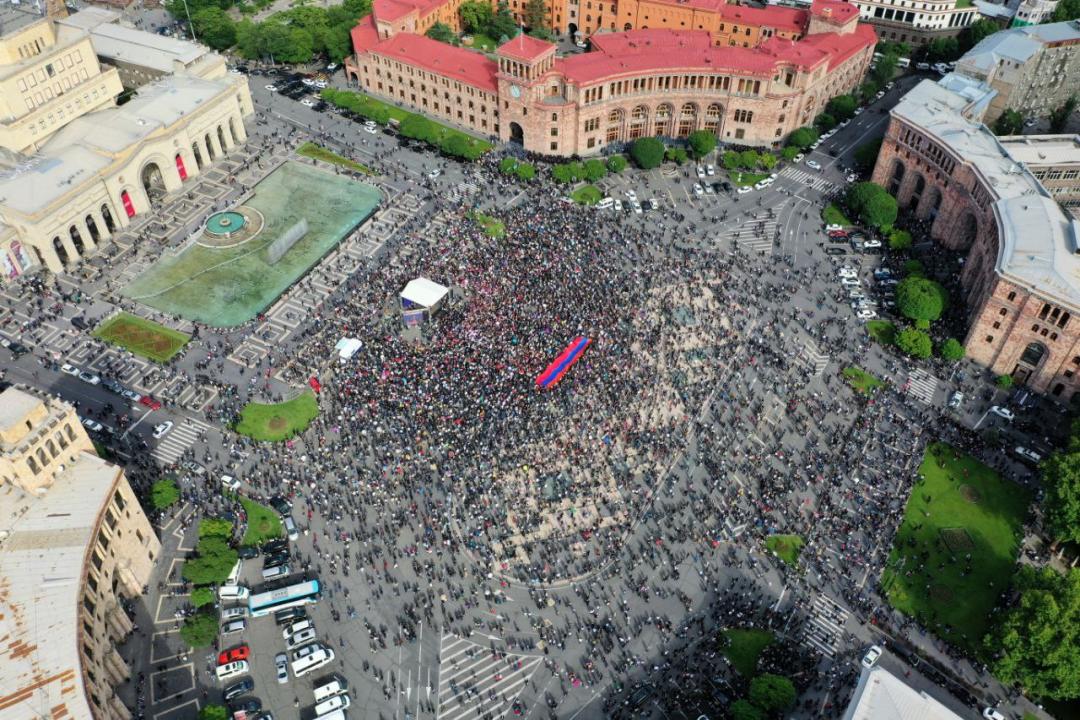
Civil Disobedience Shuts Down Key Routes in Yerevan, 226 Detained

On the morning of May 27, civil disobedience actions, initiated earlier this month by supporters of the "Tavush in the Name of Homeland" movement, resumed in Armenia. Protesters blocked key transportation routes in the Armenian capital, prompting swift action from police officers who began clearing the roads and making the first arrests.
The Yerevan-Ashtarak and Yerevan-Armavir highways were reported to be blocked. The protest leader, Archbishop Bagrat Galstanyan, Primate of the Tavush Diocese of the Armenian Apostolic Church, had called the day before to block all roads starting at 08:00 on Monday [local time], except those leading to the Lori and Tavush regions, where an emergency situation had developed due to major flooding. "In other places, start disobedience actions. We must deprive them (officials) of the opportunity to go to work," he emphasized.
As of 11:00 on May 27, during the civil disobedience actions organized by the "Tavush in the Name of Homeland" movement, 226 people were detained in Yerevan. The detainees were taken to the police department under Article 182 of the Code of Administrative Offenses (failure to fulfill the lawful demand of an official) of Armenia.
Response from Russia
In a conversation published on May 27, Konstantin Zatulin, the First Deputy Chairman of the State Duma Committee on CIS Affairs, Eurasian Integration and Relations with Compatriots, shared his perspective on the situation. He stated that the outcome of the protest movement in Armenia depended on the protesters' actions and law enforcement's willingness to support Nikol Pashinyan.
"It seems to me that everything further depends on the willingness, first, of the protesters to go to the end, and second, on whether the law enforcement agencies and services agree to follow Pashinyan wherever he goes in his desire to suppress the protest activity and suppress the opposition. I'm not sure they will be so monolithic if the ordeal continues. It all hinges on the presence of Azerbaijan looming over Armenia. The main reason for keeping Pashinyan in office is the fear that his ouster could lead to a flare-up between Armenia and Azerbaijan, a new war that Armenia fears and does not want. This is what keeps those who disagree with him, and today, his approval rating has fallen to a shallow level. He can no longer gather any rallying crowds in his support, unlike the opposition," Zatulin stated.
He further noted that Pashinyan would likely attempt to prevent the "Tavush in the Name of Homeland" movement from achieving power using methods similar to those he employed a few years ago.
"Everything about this movement - it has existed since the problem of transferring villages (in Armenia's Tavush region) to Azerbaijan arose. Of course, this was the last straw for those who decided to participate. It is not clear to the end what the limits of violence the prime minister and his associates are ready to use. He came to power in 2018 in exactly this way - by organizing demonstrations that were not suppressed, and any attempts to call for order were then seen as a crime against democracy. Today, he has completely reinvented himself. What was allowed to him in 2018, he does not want to allow anyone else in the year 2024," Zatulin believed.
See Also


Simonyan: “Armenia Should Trade with Turkey and Azerbaijan Instead of Closing Borders”

Mirzoyan Meets US Deputy Assistant Secretary Joshua Huck

Azerbaijani President Holds Talks with UAE and German Business Delegations on Economic Cooperation

Grigoryan Confirms Armenia’s Readiness to Dissolve OSCE Minsk Group Upon Peace Treaty Signing

